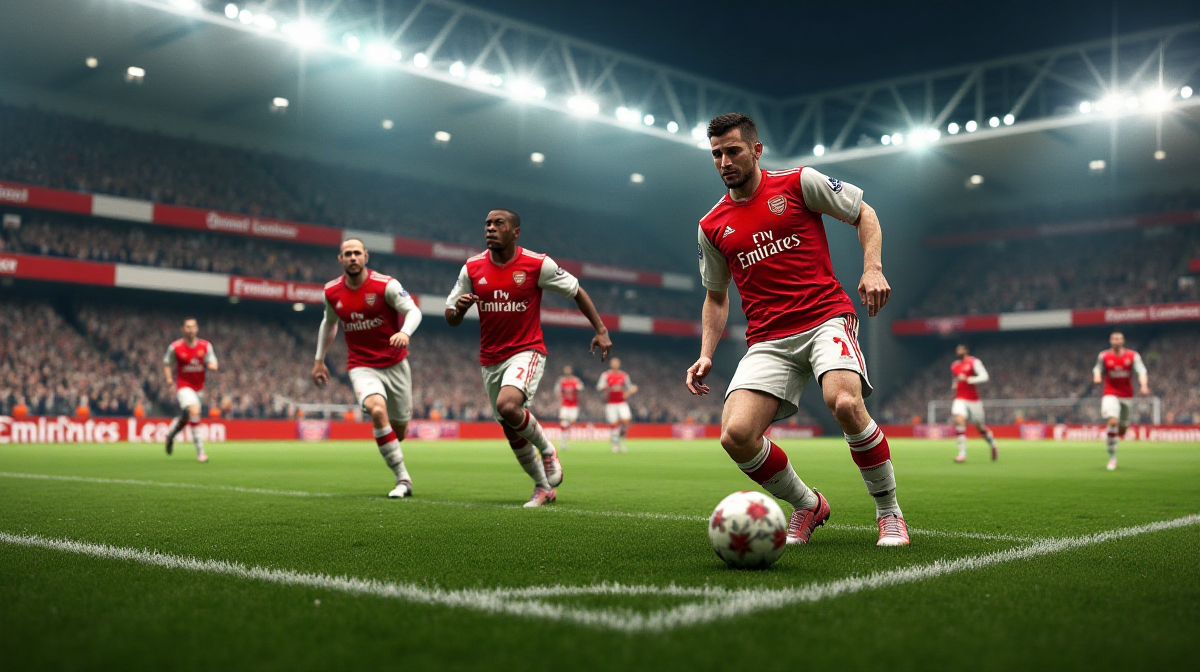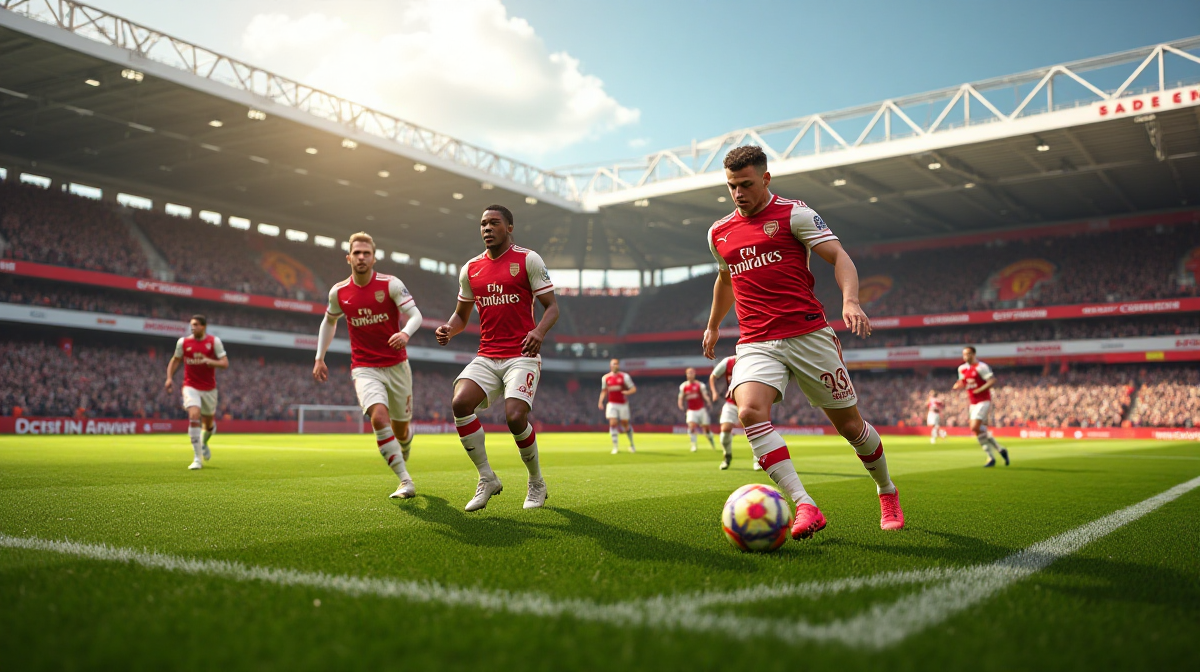Arsenal's Premier League Titles: A History
A Legacy of Success: Overview of Arsenal’s historical performance in English football.
Arsenal Football Club boasts a rich history steeped in tradition and success. From its origins as Dial Square in 1886 to becoming a dominant force in English football, the club has consistently challenged for honours. Before the advent of the Premier League, Arsenal secured 10 First Division titles, establishing a reputation for attractive attacking football and a commitment to youth development. This foundation would prove crucial as English football underwent a seismic shift. Understanding this past is key to appreciating the context of their Premier League journey, a journey often marked by both exhilarating highs and frustrating near misses. For those following the game closely, keeping track of results can be exciting, especially when considering a bet number on upcoming matches.
Defining the Premier League Era: Briefly explain the formation and significance of the Premier League.
The formation of the Premier League in 1992 revolutionized English football. Driven by financial ambitions and a desire to capitalize on television revenue, the top clubs broke away from the Football League to form a new, commercially focused entity. This change ushered in an era of increased investment, global reach, and tactical innovation. The Premier League quickly became the most-watched football league in the world, attracting top players and managers from across the globe. This new landscape presented both opportunities and challenges for established clubs like Arsenal. Checking a bet number today can often reflect the increased attention and investment in the league.
Scope of this History: Outline what titles and periods will be covered.
This history will delve into Arsenal’s triumphs and tribulations within the Premier League era, beginning with the inaugural season in 1992. We will examine the key periods of success under George Graham and Arsène Wenger, analyzing the tactical approaches, pivotal players, and defining moments that shaped the club's fortunes. The period following the 'Invincibles' era, marked by stadium relocation and a shift in competitive dynamics, will also be explored. Finally, we will assess the current trajectory under Mikel Arteta, evaluating the club's rebuilding process and future prospects. We will also touch upon significant rivalries and the club's overall impact on the Premier League landscape.
The First Era of Dominance: George Graham & the Early 90s
Building a Fortress: Graham’s defensive revolution and its impact.
George Graham inherited a talented but underachieving Arsenal side in 1986. He swiftly implemented a defensive philosophy, prioritizing organization, discipline, and a relentless work ethic. This transformation saw Arsenal evolve into a formidable force, renowned for its resilience and ability to frustrate opponents. Graham’s focus on defensive solidity laid the groundwork for the club's success in the early Premier League years.
1990-91 League Title: Key players, memorable moments, and tactical approach.
Arsenal’s 1990-91 First Division title was a testament to Graham’s tactical acumen and the team’s unwavering commitment. Key players like David Seaman, Nigel Winterburn, Lee Dixon, and Tony Adams formed a rock-solid defensive unit. A late goal against Manchester United, securing a crucial victory, proved pivotal in their title charge. The team's ability to grind out results, even when not at their best, was a hallmark of their success.
1997-98 League Title: How Arsenal reclaimed the title, contrasting playstyle with Manchester United.
After a seven-year wait, Arsenal reclaimed the Premier League title in 1998. This victory was achieved with a more expansive and dynamic style of play compared to their earlier success. While Manchester United remained a dominant force, Arsenal’s attacking flair and tactical flexibility allowed them to edge out their rivals. The emergence of players like Marc Overmars and Patrick Vieira added a new dimension to the team. A keen eye on form and results might lead some to consider a 1xbet bet slip number check for insights.
Key Players of the Graham Era: Adams, Seaman, Dixon, Winterburn – their contributions.
The bedrock of Arsenal’s success during the Graham era was undoubtedly their legendary back four: Tony Adams, David Seaman, Lee Dixon, and Nigel Winterburn. Adams, the captain, provided leadership and unwavering determination. Seaman was a world-class goalkeeper, consistently delivering match-winning performances. Dixon and Winterburn were tireless full-backs, renowned for their defensive prowess and attacking contributions. Their collective understanding and commitment formed an impenetrable shield.

The 'Invincibles': Arsène Wenger's Revolution
Arsène Wenger’s Arrival & Transformation: Changing Arsenal’s culture, training, and scouting.
The arrival of Arsène Wenger in 1996 marked a turning point in Arsenal’s history. Wenger revolutionized the club's culture, emphasizing a holistic approach to football that encompassed diet, training, and psychology. He introduced a sophisticated scouting network, identifying and nurturing young talents from around the world. This transformation laid the foundation for Arsenal’s most successful period in the Premier League era.
1997-98 League Title : Building towards future success.
The 1997-98 triumph wasn’t just a title win; it was a signal of intent. It demonstrated Wenger’s ability to blend established players with emerging talents, creating a dynamic and exciting team. This success provided a platform for further investment and development, laying the groundwork for the 'Invincibles' era.
2001-02 League Title: Dominance through attacking football.
Arsenal’s 2001-02 title win was characterized by their exhilarating attacking football. Thierry Henry emerged as a global superstar, scoring crucial goals and dazzling opponents with his skill and pace. The team’s fluid passing and dynamic movement made them a joy to watch.
2003-04: The 'Invincibles' – An Unprecedented Achievement.
The Season Overview: Undefeated run, key matches, and statistical highlights.
The 2003-04 season remains arguably the greatest achievement in Premier League history. Arsenal went through the entire 38-game season undefeated, a feat that has never been replicated. Key victories against Manchester United and Chelsea showcased their dominance. The team scored 73 goals and conceded just 26, demonstrating their defensive strength and attacking prowess.
Key Players of the Invincibles: Henry, Bergkamp, Vieira, Cole – individual brilliance.
Thierry Henry was the talisman of the 'Invincibles,' scoring 30 league goals. Dennis Bergkamp provided artistry and creativity in midfield. Patrick Vieira was the commanding presence in defensive midfield, while Ashley Cole was arguably the best left-back in the world. Their individual brilliance, combined with a strong team ethic, was the key to their success. The premier league top score that season was undeniably Henry.
Tactical Innovations: Wenger’s attacking philosophy and adaptability.
Wenger’s attacking philosophy, based on quick passing, intelligent movement, and a relentless pressing game, was the cornerstone of the 'Invincibles' success. He fostered a culture of adaptability, allowing the team to adjust their tactics based on the opposition.
The Near Misses: Challenges to Manchester United & Chelsea dominance .
Following the 'Invincibles' season, Arsenal consistently challenged for the title but were unable to replicate their undefeated success. The rise of Chelsea and Manchester United, backed by significant financial investment, made it increasingly difficult to compete. Despite this, Arsenal remained a consistent Champions League qualifier, showcasing their resilience and commitment to excellence.

Post-Invincibles & The Transition Period
Maintaining Champions League Qualification: Arsenal’s consistency despite limited Premier League success.
Despite a lack of Premier League titles, Arsenal consistently qualified for the Champions League during this period, demonstrating their ability to compete with the best clubs in Europe. This consistency was a testament to Wenger’s managerial skills and the team’s unwavering commitment.
FA Cup Success as a Consolation: Highlight FA Cup wins during this period.
During the period of limited Premier League success, Arsenal enjoyed success in the FA Cup, winning the trophy in 2005, 2014, and 2017. These victories provided a much-needed boost to morale and offered fans a taste of silverware.
Stadium Move to Emirates Stadium: Impact on spending and League Performance.
The move to the Emirates Stadium in 2006 had a significant impact on Arsenal’s finances and league performance. The cost of building the new stadium limited the club’s ability to compete financially with their rivals, leading to a period of austerity and reduced spending on players.
Key Players of the Post-Invincibles Era: Fabregas, van Persie – talents emerging and departing.
Cesc Fàbregas and Robin van Persie emerged as key players during this period, showcasing their talent and scoring ability. However, both players eventually departed the club, highlighting the challenges Arsenal faced in retaining their top stars.
The Arteta Era & Return to Contention
Early Challenges & Rebuilding Phase: Initial struggles under Arteta.
Mikel Arteta’s appointment in 2019 marked the beginning of a new chapter for Arsenal. He inherited a team in need of rebuilding and faced significant challenges in his early days.
Gradual Improvement and Tactical Refinement: Evolution of the team's playing style.
Arteta gradually implemented his tactical vision, focusing on a possession-based style of play with a high pressing game. The team showed signs of improvement, becoming more organized and disciplined.
2022-23: Title Challenge – Close but no cigar.
Key Tactical Battles and Turning Points.
The 2022-23 season saw Arsenal mount a serious title challenge, pushing Manchester City all the way. Key tactical battles against their rivals proved crucial. Turning points included victories against Manchester United and Chelsea.
The Rise of Saka, Martinelli & Ødegaard.
Bukayo Saka, Gabriel Martinelli, and Martin Ødegaard emerged as key players, showcasing their talent and becoming integral to Arteta’s system. Their youthful energy and attacking prowess injected new life into the team.
Rivalries & Key Matches
Arsenal vs Manchester United: Historical context and memorable clashes.
The rivalry between Arsenal and Manchester United has been one of the most intense and captivating in Premier League history. Memorable clashes include the 1998 title decider and the numerous battles between Wenger and Sir Alex Ferguson.
Arsenal vs Chelsea: London derbies and title races.
The London derby between Arsenal and Chelsea is always a fiercely contested affair. The rivalry has intensified in recent years, with both clubs challenging for Premier League titles.
Arsenal vs Liverpool: High-scoring encounters and contrasting philosophies.
The encounters between Arsenal and Liverpool are often high-scoring and entertaining, showcasing contrasting footballing philosophies.
Conclusion
Arsenal’s Place in Premier League History: Summing up their achievements and influence.
Arsenal’s contribution to Premier League history is undeniable. From the early dominance under George Graham to the revolutionary 'Invincibles' era under Arsène Wenger, the club has consistently pushed the boundaries of English football. Their influence extends beyond on-field success, shaping the tactical landscape and inspiring generations of players and fans.
Looking Ahead: The future of Arsenal and their pursuit of further Premier League titles.
Under Mikel Arteta, Arsenal is once again a force to be reckoned with. The club’s commitment to youth development, coupled with a clear tactical vision, provides a solid foundation for future success. The pursuit of further Premier League titles remains the ultimate goal, and the club is well-positioned to challenge for honours in the years to come.

